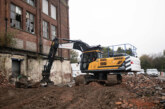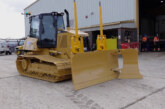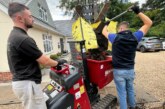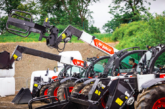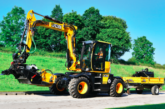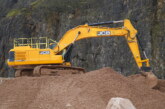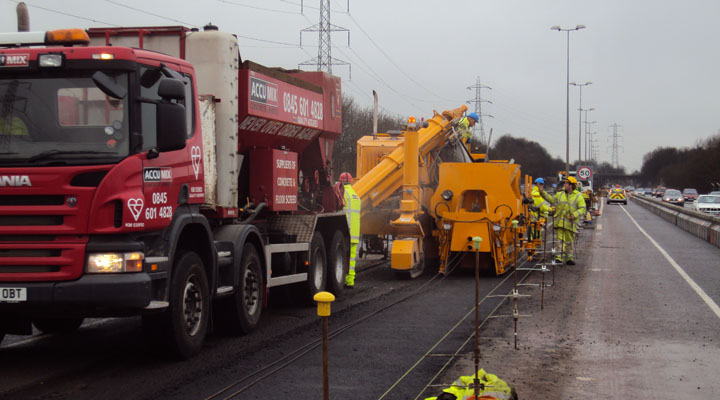
Construction Plant News Editor, Lee Jones visits the pioneer of the UK’s volumetric concrete mixing sector
There are few manufacturers in any sector that can legitimately claim to have introduced an entirely new industry to these shores, but when Armcon brought the concept of volumetric concrete mixing to the British market the Cheshire-based pre-cast and concrete equipment specialist did just that. That was more than twenty years ago, but even as recently as the mid-2000s the volumetric mixing method still represented less than 1 per cent of all concrete produced in the UK. Fast forward to the present day, however, and that figure now stands at around 11 per cent. So what’s changed? Again, the company which can claim much of the credit for that exponential advance is Armcon who, by championing a new method of delivering concrete to site, has in the process effectively driven the development of an industry within an industry.
“Not only did we initiate the UK introduction of mobile volumetric concrete mixers,” explains David Lukey, Armcon’s Sales and Marketing Director “we have also put into place a significant infrastructure and support around it.” As the training and conference facilities at its substantial Poynton facility can testify, Armcon is not content to simply supply machinery. Instead, they will fully equip their customers with the tools for the job, with all the professional support that they require in making a success of delivering concrete to site. “We invite at least a few hundred customers to this location every year,” enthuses David, “and we train them in every area of the business, from how they can get into the concrete mixing industry, how concrete is tested, regulated and made professionally, to the use of additives and admixtures for profit, and for a better quality of product.
“Our aim is to assist customers to make money in this industry, and we’ll provide as much backing, particularly to those looking to diversify into on-site deliveries of concrete from other activities, as is needed. If you’re already running tipper wagons, skip lorries, or any other plant and machinery for that matter, then adding volumetric concrete mixers to your fleet is easy to bolt on as a business diversification.” In terms of the training that is offered Armcon hosts a Concrete Day at Poynton, which is a general and open-to-all introduction to volumetric mixing, including those thinking of getting into the industry. For existing owners and operators there’s an
Advanced Operator Day, which covers the theory and practice of running the equipment, with a particular focus on the critical safety issues. 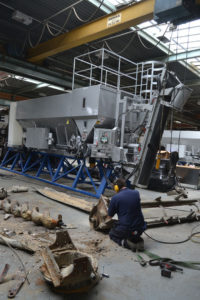 “It gives company’s piece of mind in that they are fulfilling their responsibilities in terms of duty of care, whilst they can equally be assured that their assets are being protected and their employees are competent in the use of the machine,” explains David. “Unlike every other piece of plant there is at present there is no officially certified training requirement for our class of equipment but that’s certainly something that we are looking to work towards.”
“It gives company’s piece of mind in that they are fulfilling their responsibilities in terms of duty of care, whilst they can equally be assured that their assets are being protected and their employees are competent in the use of the machine,” explains David. “Unlike every other piece of plant there is at present there is no officially certified training requirement for our class of equipment but that’s certainly something that we are looking to work towards.”
Armcon began its trading life supplying large scale static, automated machines for the production of pre-cast concrete systems and this developed into the production of smaller decorative pre-cast items like paving slabs, fence posts and panels. Given that there was always destined to be a finite number of end users with the necessary demand to justify the investment in such expensive and sizeable pieces of capital equipment, however, this was a business model that would inevitably exhaust its potential for growth. Once the pool of potential customers began to dissipate, the company embarked on a quest for commercial opportunities with the appropriate synergy with its existing pre cast concrete heritage, and in the process encountered Cementech, a US-based supplier of volumetric concrete mixers.
Initially, the idea was to import some of the smaller machines from that company, and use them to service the pre cast market with which Armcon was already fully conversant. Essentially, these static units would be sat in a yard making concrete for pre cast moulds but, having already demonstrated that they were certainly not a company to stand still, Armcon then took the concept and ran with it – or, to be more accurate in this instance, drove with it.
For the contractor presented with the choice of having his concrete delivered in a traditional drum mixer, or a volumetric unit, what then are the advantages of opting for the latter? With the former, the builder is compelled to order concrete from a central point in a fixed quantity – and that ordering process can often involve a tricky calculation; too little and it’s a disaster, too much and you’re presented with the prospect of disposing of the excess. As a result, if a builder estimates that they will need 3m3 of concrete he or she would traditionally have ordered 3 ½ to 4m3, but with the escalating costs associated with transporting and disposing of waste from construction sites that ½ – 1m3 of surplus material is no longer an insignificant outlay.
With the Armcon solution, the batching plant is effectively transported to the site, which means that exactly the right quantity of material for that job is delivered. “The growth we’ve seen in volumetric mixers is being driven by consumer demand,” continues David. “The end users of concrete recognise the convenience of a unit being driven onto site with all the materials needed to make concrete on the back. The job can then be fulfilled and the contractor will be presented with a digital ticket detailing the exact quantity. And here’s the key point; you pay for exactly what you’ve used – no more, no less.
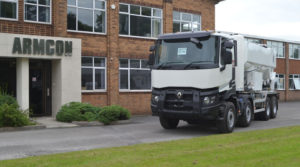 There’s no problem with any waiting or any delay because nothing’s going off as a consequence – simply pull a lever and seconds later you have fresh concrete.” The advocates of the volumetric delivery method also maintain that there are inherent quality issues to be considered. Because it’s so fresh, and is mixed on a continuous basis, the cement hydrates and chemically reacts far more efficiently than if it was pre-mixed in a batching plant prior to transportation, which means it ultimately does its job in the build much better. In addition, with cement the most expensive part of the mix, concrete produced in an Armcon unit can be made to the same specified strength but with a reduced quantity of dust – and with less carbon hungry cement production around the world as a consequence that’s good for the environment, as well as offering a healthier proposition for the contractor’s balance sheet. Volumetric mixers also lend themselves to specialist applications, such as lightweight concrete products, where there is an advantage to having the batching plant mixing those products at the point of construction.
There’s no problem with any waiting or any delay because nothing’s going off as a consequence – simply pull a lever and seconds later you have fresh concrete.” The advocates of the volumetric delivery method also maintain that there are inherent quality issues to be considered. Because it’s so fresh, and is mixed on a continuous basis, the cement hydrates and chemically reacts far more efficiently than if it was pre-mixed in a batching plant prior to transportation, which means it ultimately does its job in the build much better. In addition, with cement the most expensive part of the mix, concrete produced in an Armcon unit can be made to the same specified strength but with a reduced quantity of dust – and with less carbon hungry cement production around the world as a consequence that’s good for the environment, as well as offering a healthier proposition for the contractor’s balance sheet. Volumetric mixers also lend themselves to specialist applications, such as lightweight concrete products, where there is an advantage to having the batching plant mixing those products at the point of construction.
That’s the current state of play, but how can the industry seek to grow and evolve to continue to meet the demands of an expanding customer base? “Last year was our busiest year,” declares David, “and we’re now exploring a number of avenues that have diverged from the main path. We’re heavily involved in the utilities sector, for instance, because the machines lend themselves to fast and efficient trench reinstatement and remote locations like wind farms can be serviced with concrete more effectively with a mobile batching plant.”
“Not only did we initiate the UK introduction of mobile volumetric concrete mixers, we have also put into place a significant infrastructure and support around it.”
David Lukey, Armcon’s Sales and Marketing Director
Indeed, to describe the units that Armcon supplies as concrete mixers would be a gross simplification of their potential uses. A mobile batching plant is essentially a machine that proportions and brings together different components, which can, of course, be sand and cement, but could equally be a host of other materials that the building industry can utilise, often with the happy consequence of recycling or reusing waste products that would otherwise be destined for landfill. “Applications can be as diverse as liquid floor screeds for a building contractor to the processing of power station ash for a power company,” explains David. “We’ve developed a concept where we take the spoil from aggregate washing plants, and blend it with MOT aggregate to produce a saleable commodity. Similarly, asphalt planings from road resurfacing and repair are mixed with an emulsion to be reused as pothole filler. The pedigree of these machines is proven and with a few tweaks and modifications to our existing equipment there’s a lot else that we can achieve far beyond concrete production.”
In fact, even in its core business of concrete mixing Armcon avoids the one size fits all, off the shelf. Whilst the underlying principle of each unit that leaves the factory gates is the same one customer might specify a particular configuration. For start-up companies making their first foray into the volumetric business, anyone who is already operating a fleet of construction plant, adding a fleet of mobile batching plants into the mix could well prove to a rewarding venture.
For further information visit www.armcon.com

